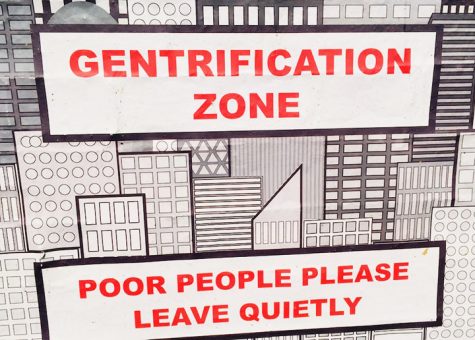“WE CAN’T LIVE HERE ANYMORE!”
May 2, 2019

Ten years ago, no one would have imagined a day when they could be hanging out with friends by the painted walls in Wynwood or maybe eating dinner at a new expensive restaurant in Little Haiti. Today, however, those neighborhoods, once known for high crime and urban blight, are cool.
Most people, when strolling through a city, will not know if they are walking in a gentrified community. Despite the nature of gentrification and its lavish finished products, it is surprisingly difficult to define and to reach a judgment about whether it is good or bad.
Wynwood Cool
Wynwood has undergone a major transformation over the past decade. Sophomore Juliana Gonzalez, who has experienced this gentrification first hand, said, “My father grew up in his father’s restaurant in Wynwood, but two years ago my father had to sell his restaurant because he couldn’t pay the rent anymore. Property values have skyrocketed.”
For junior Yaneilys Ayuso, it seems as though gentrification follows her no matter where she moves because rent prices rise out of her parents’ budget. “My parents were offered a sum of money to move out of our lifelong home in Wynwood,” she said. “When we took the money, it wasn’t enough to buy any other house in Wynwood. We ended up renting a small house around the area, but it quickly turned into a nightmare when the landlord started scamming my family out of money and hiking the rent prices up. Eventually he evicted us, giving my family only a weekend to move out.”
Currently, Yaneilys lives with six other people in a two-bedroom apartment in North Miami. She hopes that when people think of gentrification in Wynwood, they think of families like hers. She said, “Please remember you’re having fun at the expense of my displacement.”
What is gentrification?
Although there are as many different definitions as there are people, gentrification can be officially defined, according to Merriam-Webster, as the process of repairing and rebuilding homes and businesses in a deteriorating area, followed by an influx of wealthier people that often results in the displacement of earlier, poorer residents.
Junior Amanda Suarez, who is taking Multicultural Studies, defines gentrification as when developers buy large pieces of land, so they can cement over and build huge condos and shopping centers, but not for the residents of the communities who have spent generations there and can’t afford the new shopping centers and living spaces.
Senior Reynaldo Cardenas, who is a champion debater, describes it as “just rich, typically white people, redistributing wealth into traditionally lower income communities to make profits.”
Who Benefits?
When discussing gentrification, it is important to mention instances where gentrification has occurred, said Multicultural Studies teacher Ms. Fernandini. The Magic City Special Area Plan is an instance where accelerated displacement and gentrification is occurring in Little Haiti. She said that the plan is in violation of the Miami 21 zoning code which entails a holistic approach to land use and urban planning.
Junior Lionardo Perez thinks that instead of providing affordable housing and development that fits the area, Magic City developers are trying to avoid providing community benefits in exchange for massive construction.
Little Havana has also been subject to its own forms of gentrification. Senior Yosmany Quesada said, “I live in Little Havana and all the homes around me have been renovated and wealthier whiter people live in them now. I don’t know how long it’s going to be till my home is next.”
Modernizing Cities or Displacing Residents?
Having experienced similar situations, sophomore Kiana Ramirez justifies her social and political beliefs of why gentrification is bad. She said, “The communities that are gentrified add to the homeless population which then turns into intergenerational poverty.”
Senior Juan Aguilar has similar views. “Over the years I’ve observed that we’re angry that there are a lot of homeless people because it reflects negatively on the community,” he said, “but homelessness isn’t luxurious living. Homelessness results in arrest and felony charges, which then creates a cycle of joblessness.”
Others, however, are not so negative about gentrification. Senior Emmanuel Garit thinks that cities need gentrification to keep up with technology and time. Junior Angel Martos said, “It’s simply another form of development, and nothing should be done about it. Gentrification is a natural process.”
AP Macroeconomics teacher Mr. Rosales sees both sides of the issue but thinks that the marginal benefits and the marginal cost of living and working in gentrified communities aren’t sufficient to maintain the workers.
He said, “Gentrification does generate revenue for cities but even then, pricing people out of neighborhoods and limiting affordable housing is wrong. At what cost do we continue renovating and developing?”
Can it be Stopped?
If gentrification seems to be negatively affecting and scaring so many communities, is there anything being done to stop it or slow it down? Multicultural Studies teacher Ms. Fernandini said, “People are outraged that cities are divesting from communities, so they’ve begun to create petitions and organize for affordable housing. These gentrifying contractors are violating the law, and many people are ready to expose this.”
Yaneilys Ayuso proposed building confidence and knowledge in the community, saying, “Communities have to be made aware of these issues and their resolutions, so developers can’t manipulate residents out of their homes.”
Senior Johanna Mendoza, who is also taking Multicultural Studies, said, “The state of Florida currently doesn’t have rent control, but securing rent control is the first step, also making sure that stricter policies in favor of affordable housing are passed.”
Gentrification in Miami Facts
- Gentrification often shifts a neighborhood’s racial/ethnic composition and average household income by developing new, more expensive housing, businesses and improved resources.
- Miami is the only southern U.S. city ranked on the top 10 most expensive list. The city’s average household income stands at about $48,100, but to be financially stable it should be $77,000 or more.
- The median price of homes currently listed in Little Haiti is $389,000. The median rent price in Little Haiti is $1,975, which is lower than the Miami median of $2,400.
Sources: Themiamihurricane.com, Zillow.com




